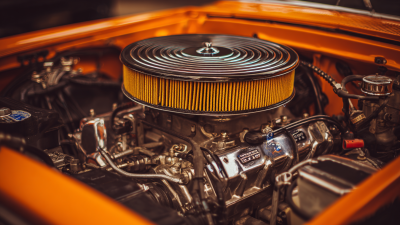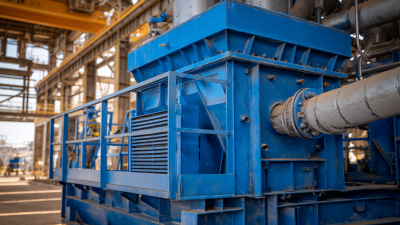Choosing the right fuel filter for your vehicle is essential for maintaining optimal engine performance and longevity. A fuel filter plays a crucial role in ensuring that clean fuel reaches your engine, protecting it from contaminants that can cause damage and reduce efficiency. With a myriad of options available on the market, selecting the appropriate fuel filter can be overwhelming. This blog will provide a comprehensive comparison of different types of fuel filters, highlighting their features, benefits, and compatibility with various vehicle makes and models. By the end of this guide, you will have a clearer understanding of what to look for when choosing a fuel filter, enabling you to make an informed decision that supports your vehicle’s health and performance.

 Fuel filters play a crucial role in maintaining the overall health and performance of your vehicle. According to an automotive maintenance report by the National Institute for Automotive Service Excellence (ASE), a clogged fuel filter can reduce engine performance by as much as 10% to 15%. This decrease in efficiency not only affects your vehicle's acceleration but can also lead to more serious engine problems if not addressed in a timely manner. Regularly replacing your fuel filter is essential to ensure that contaminants, such as dirt and rust, do not compromise the fuel system, keeping the engine running smoothly and efficiently.
Fuel filters play a crucial role in maintaining the overall health and performance of your vehicle. According to an automotive maintenance report by the National Institute for Automotive Service Excellence (ASE), a clogged fuel filter can reduce engine performance by as much as 10% to 15%. This decrease in efficiency not only affects your vehicle's acceleration but can also lead to more serious engine problems if not addressed in a timely manner. Regularly replacing your fuel filter is essential to ensure that contaminants, such as dirt and rust, do not compromise the fuel system, keeping the engine running smoothly and efficiently.
Moreover, the American Automobile Association (AAA) indicates that fuel filtration systems should be replaced every 30,000 to 50,000 miles, depending on the vehicle and driving conditions. By neglecting this aspect of vehicle maintenance, motorists risk expensive repairs down the line. Fuel filters are designed to protect fuel injectors, which can cost upwards of $300 to $1,000 to replace if damaged by poor fuel quality. This highlights the importance of selecting the right fuel filter that meets OEM specifications and suits your vehicle’s unique requirements, ultimately prolonging the life of your engine and maintaining optimal performance.
When selecting a fuel filter for your vehicle, several key factors come into play. One of the most important considerations is the compatibility of the filter with your vehicle's make and model. Different vehicles require specific filters tailored to their fuel systems. Always consult your owner’s manual or a reliable parts retailer to ensure you choose the right fit.
Another critical factor is the filtration efficiency of the fuel filter. High-quality filters can prevent contaminants from entering your engine, which helps maintain its performance and longevity. Look for filters that offer a high micron rating, ensuring that even the smallest impurities are filtered out.
**Tip:** When replacing your fuel filter, consider the replacement interval recommended by the manufacturer. Regular changes can prevent fuel system issues and keep your engine running smoothly.
Additionally, consider the brand reputation and warranty offered with the filter. Established brands often provide better quality products backed by warranties, indicating confidence in their durability and performance.
**Tip:** Check online reviews and ask for recommendations from trusted mechanics to find the most reliable options available. The right fuel filter is not just about keeping your fuel clean; it's about safeguarding your engine's health over the long term.

When selecting the right fuel filter for your vehicle, it is essential to understand the different types available and their specific applications. Fuel filters can be categorized mainly into three types: inline filters, cartridge filters, and bowl filters. Inline filters are often used in modern vehicles due to their compact size and efficiency. According to a report by MarketsandMarkets, the global automotive fuel filter market is projected to reach $4.2 billion by 2026, driven by the increasing demand for fuel-efficient vehicles, which has heightened the importance of the quality of fuel filters in maintaining engine performance.
Cartridge filters are typically found in diesel engines because they can handle higher pressure and filtration needs. A study by Grand View Research highlighted that the demand for diesel fuel filters is expected to grow at a CAGR of 4.5% from 2021 to 2028, further emphasizing their significance in the market. Bowl filters, on the other hand, are commonly used in larger vehicles, such as trucks, where fuel contamination is a significant concern. Understanding these types helps to ensure you select the right fuel filter that aligns with your vehicle’s specific needs, ultimately contributing to better performance and longevity.
When selecting the right fuel filter for your vehicle, understanding the size and fit is crucial for optimal performance. Fuel filters are often overlooked, yet they play an essential role in maintaining a clean and efficient fuel system. Reports indicate that a significant number of engine failures are attributed to fuel contamination, making the choice of an appropriate filter even more critical. Factors such as the filter's micron rating, flow rate, and compatibility with your vehicle's fuel type can substantially impact engine performance.
Tip: Always check your vehicle's manual for the manufacturer's specifications regarding fuel filter size and fit. This will help you avoid common mistakes that can lead to engine issues. Moreover, consider factors like the style of the filter, whether it's in-line or cartridge-type, based on your vehicle's design.
When measuring for fit, ensure that you gauge both the diameter and overall length of the filter. An ill-fitting fuel filter could lead to leaks or inadequate filtration, compromising engine efficiency. As a general rule, filters should be replaced regularly, with many experts recommending a change every 10,000 to 15,000 miles to maintain clean fuel flow and engine health.
Tip: When shopping, inspect the filter for materials that can withstand your vehicle’s fuel type and operating conditions. A high-quality filter can prevent particles from entering your engine, which is particularly important with the rising use of varied fuel types in racing and other applications.
When it comes to maintaining your vehicle's performance, the fuel filter plays a crucial role in ensuring that contaminants do not enter the engine. Proper installation and regular maintenance of your fuel filter can enhance engine efficiency and longevity. Industry reports indicate that a clogged fuel filter can reduce fuel pressure by up to 10 psi, leading to suboptimal engine performance.
One key tip for installation is to ensure that you are using the correct fuel filter for your specific vehicle model. Refer to your owner’s manual or consult with a professional to identify the right specifications. When installing, make sure to check the orientation of the filter — incorrect installation can cause leaks and damage.
Maintenance is equally important; it’s recommended to replace your fuel filter every 20,000 to 30,000 miles, depending on your driving conditions. Dirty fuel or poor-quality fuel can necessitate more frequent changes. Regularly inspecting your filter for any signs of wear or clogging can prevent costly repairs and help maintain optimal fuel efficiency, ensuring your vehicle runs smoothly for years to come.






